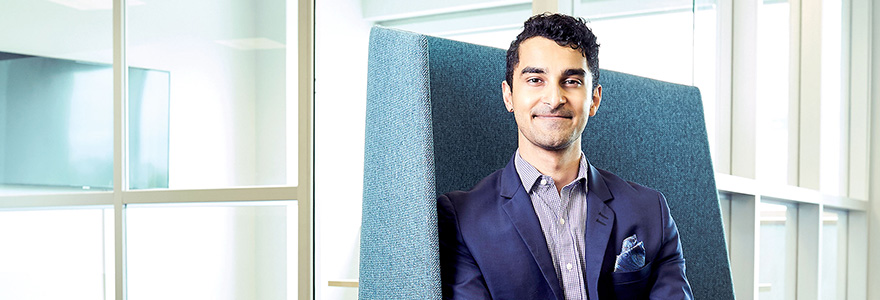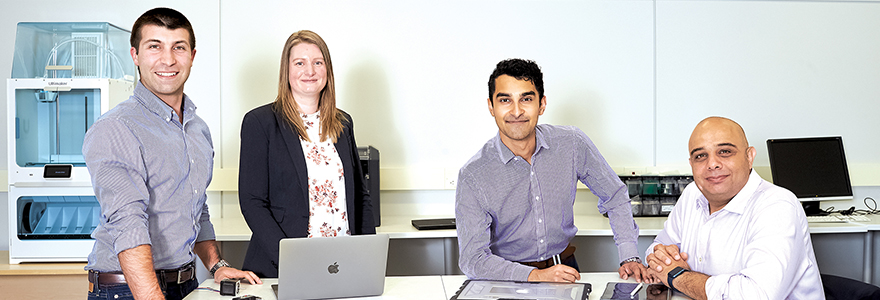The edge of innovation

Entrepreneur and scientist Saumik Biswas, PhD’20, is taking medical innovation to the next level with medical technology start-up Tenomix
By Jennifer Parraga, BA’93
Saumik Biswas, PhD’20, says that the past two years have flown by faster than he would have ever imagined.
Not only did he graduate with his PhD in Pathology and Laboratory Medicine, but he also completed his fellowship with Western University’s Medical Innovation Fellowship Program and together with his partners, launched and incorporated Tenomix – a medical technology startup.
The pace hasn’t slowed during the past few months, as the team has raised significant, non-dilutive funding and developed an alpha prototype that targets a long-standing and laborious process in pathology.
Code-named the Lymphonator, the technology is a benchtop robotic scanning device that uses artificial intelligence to guide pathology teams in efficient and reliable lymph node collection in surgically removed colon cancer tissues.
The goal is to accurately identify the spread of cancer, and the device would automate the current manual method used by pathology staff.
The Tenomix group has completed dozens of experiments testing their alpha prototype using animal and human tissues. To date they, have collected valuable feedback on their prototype from several interested pathology end-users across North America.
In addition to Biswas, the Tenomix founding team includes Dr. Eveline Pasman, MD/PhD, who serves as Chief Operating Officer, Chief Business Officer Sherif Abdou, PhD, PEng, and Michael Lavdas, MESc, the company’s Director and Technical Advisor. All are graduates of the Medical Innovation Fellowship Program.
Biswas says that it is thanks to this highly functioning team that they have achieved so much in such a short time.
“We all have different ways of thinking – and we are well supported and guided by a strong team of software developers, expert academic collaborators and experienced mentors,” said Biswas.
“Being able to quickly learn and apply new knowledge, pivot when required and rely on other experts and collaboration, that’s what helped me through my training and right now as we launch our company,” he said. “Applying a research mindset or framework to the unknowns, and believing in yourself and your team throughout the process really make the difference.”
— Saumik Biswas, PhD'20
An early fascination for numbers coupled with two significant medical events involving his younger brother and his aunt, who died very young from cancer mis-staging, serve as the inspiration for Biswas and sparked his interest in medical innovation.
The first in his family to go to university and pursue graduate training, Biswas says he wasn’t sure what to expect. He attributes his success to mentorship that encouraged him to continue exploring opportunities, as well as a supportive family who nurtured in Biswas a value system founded on altruism and generosity.
In 2017, Biswas transferred to a PhD program with supervisor Dr. Subrata Chakrabarti, Professor, Pathology and Laboratory Medicine. His research focused on understanding disease mechanisms in the field of diabetes. He sought to explore and understand non-coding RNA molecules and the role they have in promoting diabetic complications with the eyes, kidneys and heart. In short, he wanted to identify these molecules as targets for novel diagnostic and therapeutic applications.
He attributes his success to learning early on to become comfortable with the uncomfortable, as well as understanding the value of perseverance, personal values, hard work and dedication to one’s craft, which he thanks his parents for instilling in him.
“Being able to quickly learn and apply new knowledge, pivot when required and rely on other experts and collaboration, that’s what helped me through my training and right now as we launch our company,” he said. “Applying a research mindset or framework to the unknowns, and believing in yourself and your team throughout the process really make the difference.”
During his PhD studies, Biswas was able to complete 15 publications (including two book chapters) with various collaborators, file a patent application, and received more than $60,000 in awards. He also received an opportunity to travel to Hong Kong as a visiting research fellow and work with a professor in biotechnology. This was a great introduction to how academia, research and innovation intersect.
The Western Medical Innovation Fellowship program turned out to be the perfect space for Biswas to explore his interests in health research and commercialization, exercise his creative-thinking skills and meet like-minded individuals. It was during the program that Biswas and his team met with Dr. Matthew Cecchini, MD/PhD, to explore and learn more about the tedious, expensive and unreliable process of searching through tissues by hand to find small lymph nodes as part of cancer diagnosis.
This became their project, and their solution was the Lymphonator.
Biswas’ next big goal was to take what they produced during the Fellowship to the next level. They founded Tenomix with a vision to be at the forefront of pathology innovation, where pathology staff are equipped with the right tools that help provide the best patient care.
Arming themselves with training through several accelerator programs to refine their skillsets and expand their expertise, they are on pace to have a beta prototype for early studies in 2023.

The Tenomix team (left to right) Michael Lavdas, MESc; Dr. Eveline Pasman, MD, PhD; Saumik Biswas, PhD; and Sherif Abdou, PhD, PEng.
The team continues to impress, receiving the Best Financial Model Award at Western Angels’ Demo Day, the Grand Prize at Innovation Factory’s Synapse Life Science Competition, a prestigious oncology grant from FACIT, and pitching at MaRS Discovery District. Biswas himself has been recognized with several awards, including being named to Business London’s Twenty in Their 20s list.
Of this success, Biswas says that the awards and accolades are a result of the team’s collective passion and drive, as well as the high calibre work they produce.
He is humble, yet very proud of how much has been achieved in such a short time.
“I am extremely fortunate to be surrounded by awesome teammates, mentors and several supportive communities that have contributed to all the successes so far,” said Biswas. “I have also listened to my gut and my brain, my passion and dedication to make a difference, helping me get to where I am today. I discovered my calling, and I am now in a space where I can give back to society and help others like my younger brother and ensure that no one else suffers unnecessarily like my aunt.”
Reflecting on the past few years, he feels proud to be a Western alumnus.
“Western has the right ingredients for successful commercialization and innovation, it has great clinical, engineering and research programs, top-notch hospitals and the city offers a strong business ecosystem,” he said.








